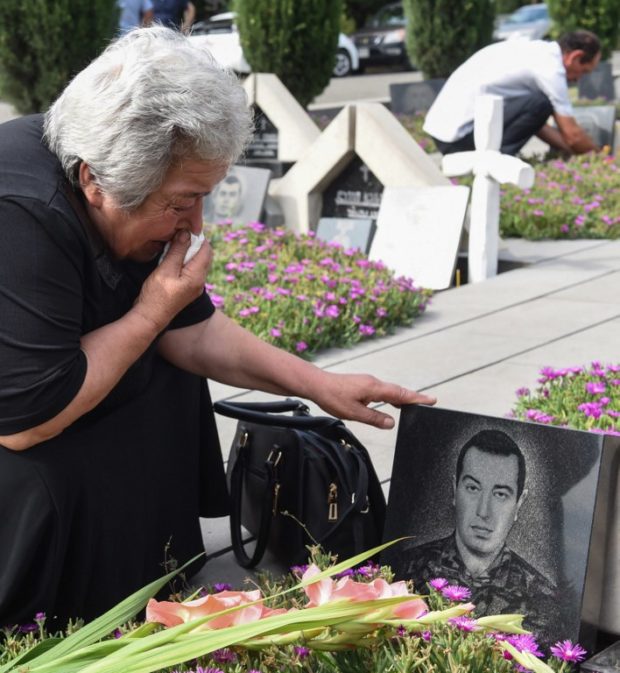Georgia marks 10th anniversary of its war with Russia

Relatives of Georgia’s servicemen killed during the 2008 brief war with Russia over control of South Ossetia mourn during a ceremony on the 10th anniversary of the conflict at the memorial cemetery in Tbilisi on August 8, 2018. / AFP PHOTO / Vano SHLAMOV
Georgia on Wednesday marked the tenth anniversary of its war with Russia which has left the country dismembered with its separatist regions of Abkhazia and South Ossetia remaining under Moscow’s control.
Georgia’s five-cross red-and-white national flags were flying at half-mast outside government buildings as the tiny Black Sea nation mourned the victims of the bloody war.
On Wednesday morning, President Giorgi Margvelashvili laid a wreath at the memorial cemetery of the Georgian soldiers killed in the conflict.
He is later due to address troops at the Senaki military base that was looted and destroyed by invading Russian forces during the conflict and then rebuilt as a showpiece of Georgia’s drive to join NATO.
Georgia and its Soviet-era master Russia have long been at loggerheads over Tbilisi’s bid to join the European Union and NATO with the spiraling confrontation culminating in a full-out war on August 8, 2008.
Article continues after this advertisementThe Russian army swept into Georgia — bombing targets and occupying large swathes of territory – after Tbilisi launched a large-scale military operation against South Ossetian separatist forces who had been shelling Georgian villages in the region.
Article continues after this advertisementOver just five days, Russia defeated Georgia’s small military and the hostilities ended with a ceasefire mediated by France’s then-president Nicolas Sarkozy, who at the time held the European Union’s rotating presidency.
After the war — that claimed the lives of hundreds of soldiers and civilians from both sides — Moscow recognized South Ossetia and another separatist enclave, Abkhazia, as independent states where it then stationed permanent military bases.
The two regions constitute 20 percent of the country’s territory.
Chorus of condemnation
Georgia and its Western partners have condemned Russia’s continued “occupation” of its territory and demanded the Kremlin reverse its recognition of Abkhazia and South Ossetia.
On Wednesday the Georgian presidency said US Secretary of State Mike Pompeo phoned Margvelashvili to reiterate Washington’s “strong support to Georgia’s territorial integrity and sovereignty.”
He “underlined that the United States would never reconcile with the occupation of Georgian territories” and “pledged to continue helping Georgia in addressing the challenges still facing the country ten years after Russia’s military aggression,” it said in a statement.
The Georgian foreign ministry denounced Russia’s continued military build-up in the separatist regions.
“The Russian Federation has not implemented its international obligations despite constant calls from the international community… and has further reinforced its illegal military presence on the ground,” the ministry said in a statement on Tuesday.
In a show of solidarity with Tbilisi, the foreign ministers of Latvia, Lithuania, and Poland, and Ukraine’s vice premier visited the country and issued a joint statement urging Russia to “start honouring international law and the right of sovereign neighboring states to choose their own destiny.”
They also expressed “strong support for Georgia’s sovereign choice to pursue the ultimate goal of membership in the EU and NATO.”
In a statement issued on Tuesday, the EU’s foreign policy chief Federica Mogherini said the “Russian military presence in both Abkhazia and South Ossetia continues to violate international law”.
The German and French foreign ministries called Russia’s recognition of the breakaway Georgian areas Abkhazia and South Ossetia “unacceptable.”
Ethnic cleansing
Mikheil Saakashvili — Georgia’s president in 2004-2013 — accused Russia of preparing to invade his country for years before the war, claiming Russian forces started entering Georgian territory ahead of Tbilisi’s offensive on the enclave in an op-ed published Tuesday.
But the Kremlin has called its Georgia campaign an “operation to force Georgia to peace” and save South Ossetia’s population from “genocide.”
Russian President Vladimir Putin –- who served as prime minister during the war — said in 2012 that he approved a plan of military action against Georgia as early as in 2006 and that Russia has “trained South Ossetian militia.”
Russia and separatist authorities in South Ossetia have rejected repeated calls from the UN General Assembly for the “safe and dignified return to their homes” of the 18,500 ethnic Georgians who were forcibly displaced from the region” in what the EU has said was “an ethnic cleansing.”
Speaking to AFP last week, Margvelashvili said that the 2008 war was part of Georgia’s “two-century fight for freedom, against the Russian imperialism.”
The Kingdom of Georgia was annexed by the Russian empire in 1801 and the country regained independence in 1918.
The short-lived Democratic Republic of Georgia was forcibly incorporated into the Soviet Union in 1921 and again became an independent nation when the USSR collapsed in 1991. /vvp